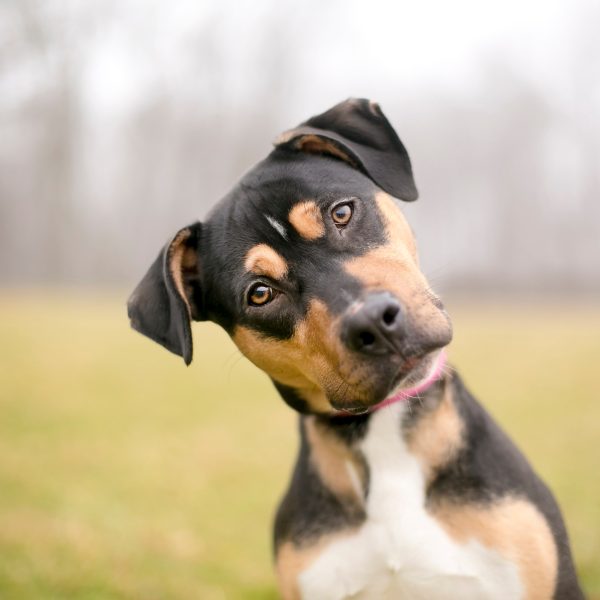What to Know About Dog Hiccups

Have you ever caught your dog hiccuping? While it’s usually normal, there are a few times when hiccups can also be cause for concern. So, how do you know what’s normal and what needs attention? Here’s what to know about dog hiccups:
Can Dogs Get Hiccups?
Yes. Just like humans, dogs can get hiccups. Hiccups are caused by a contraction in the diaphragm. The diaphragm is a piece of muscle that lies between the chest and the abdomen. This is the muscle that supports breathing.
Most of the time this muscle moves smoothly when we inhale and exhale. However, sometimes it contracts suddenly. This spasm makes the glottis close abruptly, resulting in the classic “hic” sound. Hiccups are involuntary and this contraction may occur a couple of times a minute.
Why Do Dogs Get Hiccups?
No one really knows exactly why dogs or humans get hiccups. Some scientists think it’s a leftover function from in-utero growth. Others think it’s from swallowing too much air or a way to relieve a build-up of gas.
Dogs often get hiccups when they ingest air. This often occurs when dogs eat too fast, if they play too hard, or if they’re stressed. Rapid breathing or anxiety may also cause hiccups in dogs.
Why Do Puppies Get Hiccups?
For some reason, puppies are more prone to getting hiccups than adult dogs. This may be because they tend to exhibit much more excitement than adult dogs. They may also hiccup when they are cold or anxious.
Puppies have not yet learned to slow down when eating, which can lead to hiccups. You might be unsure how often to feed a puppy but a general rule to follow is to start slow. Your vet can help you determine what’s best for your puppy and how to teach them to slow down.
Another theory for puppies hiccuping is that a puppy’s muscles aren’t as developed as an adult dog’s. This may make them much more prone to muscle contractions. It is perfectly normal for a puppy to hiccup even daily as long as it only lasts a minute or two. If it is accompanied by drooling, lethargy, or heavy breathing, contact your veterinarian. These are symptoms you should never ignore in your dog.
How to Get Rid of Dog Hiccups
In most cases, dog hiccups resolve on their own. You have probably heard many myths and old wives’ tales about how to get rid of hiccups. Certain things such as pulling your tongue, holding your breath, getting scared, or eating a spoonful of sugar or peanut butter are common myths. However, no one really knows what gets rid of hiccups in humans or dogs.
It is not advisable to scare your dog or pull their tongue to help cure their hiccups. In reality, these behaviors will upset them more than the hiccups themselves. However, there are a few things you can try to get of dog hiccups:
1. Try Light Exercise
Sometimes a little bit of movement can help that diaphragm muscle relax. Take your dog out for a short walk at a slow pace and see if the hiccups recede. If you’re looking for other ways to exercise with your dog, try some dog yoga.
2. Calm Them Down
Getting your dog to calm down will help their breathing pattern regulate. Get them to lie down and relax. Most dogs love belly rubs so rub their belly or stroke their fur to help their body calm down. You can also gently massage their chest to help their diaphragm relax.
3. Offer Them Water
Drinking water may help stop hiccups in your dog. However, be sure to supervise your dog and make sure they drink slowly and calmly. Gulping water can cause them to ingest air quickly, which can make hiccups worse or lead to other problems.
4. Encourage Slower Eating
If you have a puppy that’s experiencing hiccups, it can be helpful to help them learn to eat slower. You can accomplish this by feeding them small portions. Or, try a slow feeder bowl. Slow feeder bowls have a maze design that makes your puppy work for their food, forcing them to slow down while eating.
Slow feeder bowls are also a good option to help reduce the risk of bloat in dogs that are at a higher risk for it. These bowls are also helpful for dogs who tend to get bored. If dinner time is stressful, it might be helpful to set up a feeding station for your dog to help streamline the process.
When Should You Seek Medical Attention?
If your dog’s hiccups last more than an hour or two, you should be in contact with your veterinarian. If your dog is in pain, struggling to breathe, experiencing vomiting, or drooling excessively, contact your veterinarian immediately as these can also be symptoms of bloat in dogs and other dangerous conditions.
This is just a brief overview of what to know about dog hiccups. Most of the time, hiccups in dogs are perfectly normal and resolve after a few minutes. However, if your dog is experiencing any other alarming accompanying symptoms, be sure to talk to your vet. They’ll be able to help you assess your dog and get them the help they need.
